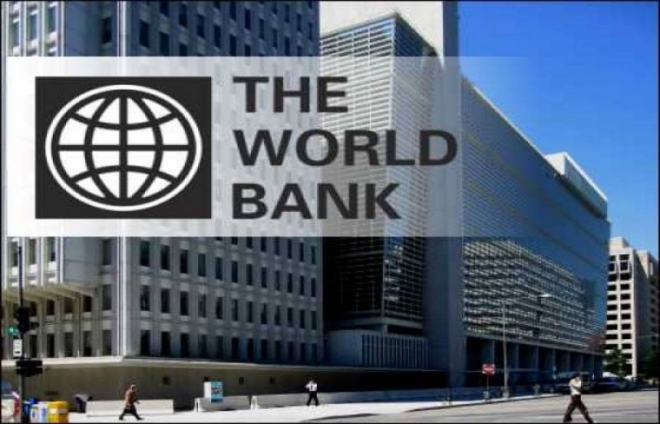The World Bank and the International Monetary Fund are coming under pressure to use their financial might to persuade Ghana to reconsider a proposed law that could lead to anyone who identifies as LGBTQ+ being jailed for three years.
Charities and campaign groups are calling on the global development bodies to tell Ghana they may stop funding the country if the proposed legislation – which will be challenged in the country’s supreme court next week – comes into effect.
The “promotion of proper human sexual rights and Ghanaian family values” bill recommends jailing anyone convicted of identifying as gay for up to three years, imprisoning “promoters” of gay rights for up to five years, and increasing the term for having gay sex from three to five years.
Elana Berger, executive director of the Bank Information Center, a charity that campaigns for better transparency, accountability and inclusion in development finance, said the World Bank was in a unique position to “persuade Ghana to reconsider” with the prospect of losing its promised $3.8bn (£3bn) of funding.

“We believe that everything the World Bank does should be moral, fair and inclusive,” she said. “Funding a country with this law will lead to discrimination against LGBTQ+ people. We’re not anti the World Bank, but it can do a lot more to improve the inclusion of its projects.”
She said the Ghanian parliament’s vote to pass the bill in February despite the threat of losing World Bank funding suggested “the desire to harm LGBTQ+ people trumps the desire to develop the economy”.
Ghana’s finance ministry has warned that if the law comes into effect it could lead to the country losing $3.8bn in World Bank financing over the next five to six years.
Losing that funding, the ministry said, could “derail” a $3bn bailout programme from the International Monetary Fund (IMF) and its efforts to restructure its $20bn debt pile. “This will in turn trigger a market reaction which will affect the stability of the exchange rate,” the ministry said in a leaked memo.
The World Bank last year halted some funding to Uganda due to the country’s newly passed anti-LGBTQ legislation, which includes the death penalty or life imprisonment for some same-sex acts, saying “fundamentally contradicts the World Bank group’s values”.
“We believe our vision to eradicate poverty on a livable planet can only succeed if it includes everyone irrespective of race, gender, or sexuality,” the bank said. “This law undermines those efforts.”
Winnie Byanyima, executive director of UNAids, said evidence showed that punitive laws such as Ghana’s were “a barrier to ending Aids, and ultimately undermine everyone’s health”.
She added: “Approaches rooted in inclusion of all people have been crucial to Ghana’s progress in the HIV response … if this bill becomes law, it will obstruct access to life-saving services, undercut social protection, and jeopardise Ghana’s development success.”
Genevieve Partington, Amnesty International’s Ghana country director, said: “The bill is one of the most draconian in Africa and seeks to further criminalise lesbian, gay, bisexual and transgender (LGBT) people.
“It also seeks to punish anyone who supports or advocates for LGBT people, including human rights defenders, medical professionals, journalists, teachers, and landlords in violation of the right to freedom of expression and association, with a prison term.”
A spokesperson for the World Bank said: “The bill has not yet been signed into law, and we generally do not comment on draft legislation. We have a longstanding and productive relationship with Ghana.”
An IMF spokesperson said: “We have learned from extensive experience that more inclusive development is more successful development. In this case, we recognise that this bill is being challenged in the courts; it is important to let that process play out.”
During a visit to Ghana earlier this year, Kristalina Georgieva, the IMF’s managing director, said: “At this point, what we know is that citizens in Ghana have challenged the constitutionality [of the law]. I will not comment on the details of the bill. Let’s see what the court have to say.”
Latest Stories
-
Heartbreak as cash-strapped Nigerians abandon their pets
3 hours -
Mining in Motion: African leaders arrive in Ghana for landmark industry summit
4 hours -
Trump’s tariffs ‘not going away’ as deadline for deals loom, top adviser says
4 hours -
MTN Ghana honours community champions at 2025 Heroes of Change Awards
4 hours -
Ensuring sanity in the professional practice space – supporting our regulatory councils
6 hours -
UK backs Morocco’s autonomy plan for Sahara as credible basis for resolution, pledges support at all levels
6 hours -
Pyramids beat Sundowns to win first-ever CAF Champions League title
7 hours -
Pyramids FC win CAF Champions League following 2nd leg victory over Sundowns
7 hours -
Pyramids FC clinch first CAF Champions League title with victory over Mamelodi Sundowns
7 hours -
Nations FC cite “poor officiating” and “security lapses” as reasons for abandoning Basake Holy Stars match
7 hours -
Breaking the cycle: School girls in Techiman unite against child marriage, demand menstrual dignity
8 hours -
2024/25 GPL: Hearts dispatch relegated Legon Cities
8 hours -
2024/25 GPL: Samartex edge Aduana Stars 2-1 in final home game
9 hours -
GPL 2024/25: Karela United thump Accra Lions at home
9 hours -
Prof. Kwaku Asare shoots down Fiscal Council proposals
9 hours

